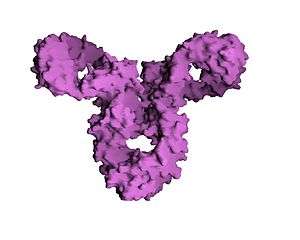IgG deficiency
IgG deficiency is a form of dysgammaglobulinemia where the proportional levels of the IgG isotype are reduced relative to other immunoglobulin isotypes. IgG deficiency is often found in children as transient hypogammaglobulinemia of infancy (THI), which may occur with or without additional decreases in IgA or IgM.
| IgG deficiency | |
|---|---|
| Other names | Selective deficiency of immunoglobulin G |
 | |
| Immunoglobulin G | |
| Specialty | Hematology |
IgG has four subclasses: IgG1, IgG2, IgG3, and IgG4. It is possible to have either a global IgG deficiency, or a deficiency of one or more specific subclasses of IgG.[1][2] The main clinically relevant form of IgG deficiency is IgG2. IgG3 deficiency is not usually encountered without other concomitant immunoglobulin deficiencies, and IgG4 deficiency is very common but usually asymptomatic.[3]
IgG1 is present in the bloodstream at a percentage of about 60-70%, IgG2-20-30%, IgG3 about 5-8 %, and IgG4 1-3 %. IgG subclass deficiencies affect only IgG subclasses (usually IgG2 or IgG3), with normal total IgG and IgM immunoglobulins and other components of the immune system being at normal levels. These deficiencies can affect only one subclass or involve an association of two subclasses, such as IgG2 and IgG4. IgG deficiencies are usually not diagnosed until the age of 10. Some of the IgG levels in the blood are undetectable and have a low percentage such as IgG4, which makes it hard to dertermine if a deficiency is actually present. IgG subclass deficiencies are sometimes correlated with bad responses to pneumoccal polysaccharides, especially IgG2 and or IgG4 deficiency. Some of these deficiencies are also involved with pancreatitis and have been linked to IgG4 levels.
References
- Barton JC, Bertoli LF, Acton RT (June 2003). "HLA-A and -B alleles and haplotypes in 240 index patients with common variable immunodeficiency and selective IgG subclass deficiency in central Alabama". BMC Med. Genet. 4: 3. doi:10.1186/1471-2350-4-3. PMC 166147. PMID 12803653.
- Dhooge IJ, van Kempen MJ, Sanders LA, Rijkers GT (June 2002). "Deficient IgA and IgG2 anti-pneumococcal antibody levels and response to vaccination in otitis prone children". Int. J. Pediatr. Otorhinolaryngol. 64 (2): 133–41. doi:10.1016/S0165-5876(02)00068-X. PMID 12049826.
- Driessen, G; van der Burg, M (June 2011). "Educational paper: primary antibody deficiencies". European Journal of Pediatrics. 170 (6): 693–702. doi:10.1007/s00431-011-1474-x. PMC 3098982. PMID 21544519.
External links
| Classification | |
|---|---|
| External resources |